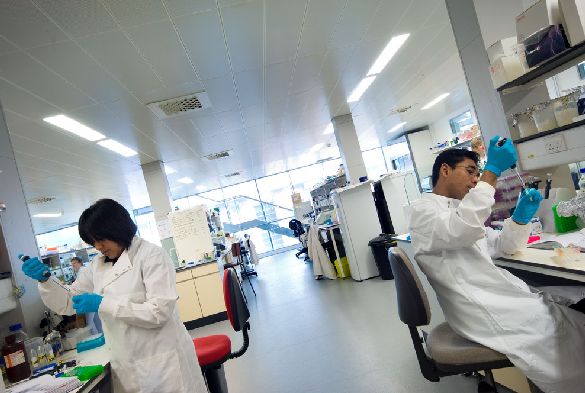
More than 10 University of Liverpool researchers have been successful in securing support for international partnerships the Newton Innovation Fund.
The £375 million initiative to develop partnerships between the UK and 15 of the Emerging Powers, including India, China and Brazil, aims to support researchers interested in collaborations across a wide range of disciplines, including environment, health and architecture.
The Fund, which also supports partnerships with Latin America, South Africa, and other parts of South Asia, is a major initiative supported by the UK Government. It encourages the development of science and innovation partnerships that promote economic development in emerging countries.
Successful applications from Liverpool include:
- Dr Roman Boulatov, School of Physical Sciences: Stiff-stilbene powered photoactuation
- Professor Geoff Dearden, School of Engineering: Research of picosecond regenerative amplifier and multi-beam laser processing
- Professor Rob Beynon, Institute of Integrative Biology: Application of quantitative proteomics to accelerate vaccine development against Schistosomiasis, a neglected tropical disease
- Dr Xin Tu, School of Electrical Engineering, Electronics and Computer Science: Novel nanosecond-pulsed plasma/catalysis process for the conversion of methane into value-added fuels
- Dr Patricia Murray, Institute of Translational Medicine: The efficacy and safety of stem cell therapies in mouse models of kidney disease
- Dr Dariusz Kowalski and Professor Leszek Gasieniec, School of Electrical Engineering, Electronics and Computer Science: Distributed algorithms for wireless communication: trade-off between time, energy and reliability
- Dr James Hartwell, Institute of Integrative Biology: Functional genomics and hormonal regulation of Crassulacean acid metabolism (CAM) in a C4-CAM facultative species
- Dr Judy Coulson, Institute of Translational Medicine: Mechanistic study of the reduction of RBM4 in cancer and its role in regulating the oncogenic SRSF1
- Professor Munir Pirmohamed, Institute of Translational Medicine: Drug induced liver injury due to tuberculosis treatment: predictive biomarkers and genetic associations
- Professor Simon Frostick, Institute of Translational Medicine: Death and disability:The vulnerability of older people in Malaysia to urbanisation and climate change
- Professor Tom Solomon, Institute of Infection and Global Health: PhD Placement Programme.
- Professor Miren Iturriza-Gomara, Institute of Infection and Global Health, MRC-DBT India Joint Centre
- Professor Atif Rahman, Institute of Psychology, Health and Society, MRC-DBT India Joint Centre
The fund is separated into three main strands, with the first focused on the mobility of PhD students, researchers and fellowships for early career researchers.
Another funding strand supports research programmes tailored to specific countries, including sustainable cities, public health and manufacturing in India. A third area looks at how research is translated for industry use.
Director of Universities UK’s International Unit – one of the delivery partners for the Newton Fund -, Vivienne Stern, will meet and congratulate Fund recipients at an event on Thursday, 9 July at the Foresight Centre.
For more information about future opportunities with the Newton Fund contact Claire Kidman at the University’s International Development Office.